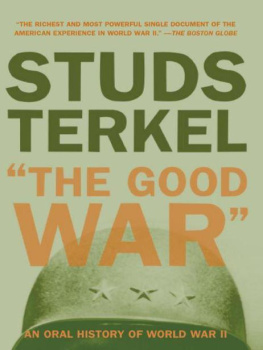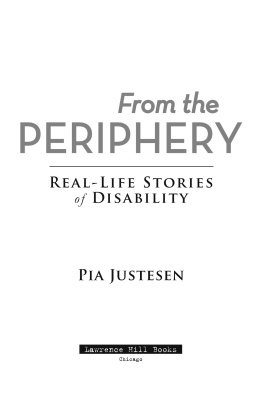Studs Terkel - The Good War An Oral History of World War Two
Here you can read online Studs Terkel - The Good War An Oral History of World War Two full text of the book (entire story) in english for free. Download pdf and epub, get meaning, cover and reviews about this ebook. year: 1985, genre: Non-fiction. Description of the work, (preface) as well as reviews are available. Best literature library LitArk.com created for fans of good reading and offers a wide selection of genres:
Romance novel
Science fiction
Adventure
Detective
Science
History
Home and family
Prose
Art
Politics
Computer
Non-fiction
Religion
Business
Children
Humor
Choose a favorite category and find really read worthwhile books. Enjoy immersion in the world of imagination, feel the emotions of the characters or learn something new for yourself, make an fascinating discovery.
- Book:The Good War An Oral History of World War Two
- Author:
- Genre:
- Year:1985
- Rating:3 / 5
- Favourites:Add to favourites
- Your mark:
- 60
- 1
- 2
- 3
- 4
- 5
The Good War An Oral History of World War Two: summary, description and annotation
We offer to read an annotation, description, summary or preface (depends on what the author of the book "The Good War An Oral History of World War Two" wrote himself). If you haven't found the necessary information about the book — write in the comments, we will try to find it.
The Good War An Oral History of World War Two — read online for free the complete book (whole text) full work
Below is the text of the book, divided by pages. System saving the place of the last page read, allows you to conveniently read the book "The Good War An Oral History of World War Two" online for free, without having to search again every time where you left off. Put a bookmark, and you can go to the page where you finished reading at any time.
Font size:
Interval:
Bookmark:

Table of Contents
OTHER BOOKS BY STUDS TERKEL
American Dreams
Lost and Found
Division Street
America
Giants of Jazz
Hard Times
An Oral History of the Great Depression
Hope Dies Last
Keeping the Faith in Troubled Times
My American Century
The Spectator
Talk About Movies and Plays with the People Who Make Them
Talking to Myself
A Memoir of My Times
Will the Circle Be Unbroken?
Reflections on Death, Rebirth, and Hunger for a Faith
Working
People Talk About What They Do All Day and
How They Feel About What They Do
FOR JAMES CAMERON,
master of his trade
NOTE
The title of this book was
suggested by Herbert Mitgang,
who experienced World War Two
as an army correspondent. It is a phrase
that has been frequently voiced by
men of his and my generation,
to distinguish that war from other
wars, declared and undeclared.
Quotation marks have been added,
not as a matter of caprice or
editorial comment, but simply
because the adjective good mated
to the noun war is so
incongruous.
F. C. Bartlett, Remembering
What did you learn in school today, dear
little boy of mine?
What did you learn in school today, dear
little boy of mine?
I learned that war is not so bad
I learned about the great ones we have had
We fought in Germany and in France
And I am someday to get my chance
Thats what I learned in school today
Thats what I learned in school.
A song by Tom Paxton
ACKNOWLEDGMENTS
A suggestion, softly offered at lunch by my editor, Andr Schiffrin, sprang forth the idea for this book. It was the sixth such occasion. Further suggestions by Ursula Bender and Tom Engelhardt helped considerably. Others at Pantheon BooksJeanne Morton, Carolyn Marsh, and Iris Brombergcame through in the practice of their respective crafts.
I might have been somewhat hesitant to undertake this project had I not been certain that Cathy Zmuda, an empress among transcribers, would be deftly working words from cassette to typed page. Dorothy Constance and Grace Zmuda assisted during an emergencyi.e., a deadline.
During my travels across the country, I was in the good hands of knowing companions, who were cicerones as well as chauffeurs. Tony Judge volunteered on several occasions in several states: Massachusetts, New Jersey, Tennessee, and parts of Kentucky, as well as California, northern and southern. Tony Lucki covered a good piece of Massachusetts real estate with me. Dave Nichols not only came through with hot leads; he knew Indiana roads forwards, backwards, and sideways. Mike Edgerly took me along the bluegrass country of Kentucky, as well as the Cumberlands.
I owe a special debt to the members of the UCLA Home Front Film Project, especially Stephen Schechter, for leading me to at least a dozen rememberers who appear in this book.
A toast to the scouts who tipped me off to a regiment of others: Ruth Adams, Robert L. Allen, Les Bridges, Mike Briggs, Cooper Brown, Cathy Cowan, John Dower, Sonja Ellingson, Carmelina Esposito, Jules Feiffer, Hamilton Fish III, Ron Freund, Rebecca Goalby, Bill Hohri, Diane Hutchinson, Kim Lady, Pat Lofthouse, the late Hans Mattick, Alice McGrath, Marylouise Oates, Irving Paley, Rudy Rasin, John Rasmus, Frank Rowe, Bob Rudner, Harrison Salisbury, Isabel Stein, Ida Terkel, Steve Veenker, John Wickes, Joan Wood, and Jerry Zbiral. (I suspect a number of these named are unaware of inestimable help they gave me; it may have come in the form of a casual comment, or as a letter or an address or phone number scrawled on a scrap of paper.)
For the sixth time around, I thank my colleagues at WFMT, Chicago, not only for allowing me frequent leaves of absence but for assuming burdens over and beyond the call of duty: Ray Nordstrand, Norm Pellegrini, Lois Baum, Jim Unrath, Andrea DAlessio, Carol Martinez, Wanda Rohm, Nancy Joyce; and especially Sydney Lewis, George Drury, and Matt McDonnell.
To all of this battalion, a salute.
INTRODUCTION
I was in combat for six weeks, forty-two days. I remember every hour, every minute, every incident of the whole forty-two days. What was itforty years ago? As he remembers aloud, the graying businessman is transformed into a nineteen-year-old rifleman. Much too tall for a rifleman, his mother cried.
This is a memory book, rather than one of hard fact and precise statistic. In recalling an epoch, some forty years ago, my colleagues experienced pain, in some instances; exhilaration, in others. Often it was a fusing of both. A hesitancy, at first, was followed by a flow of memories: long-ago hurts and small triumphs. Honors and humiliations. There was laughter, too.
In 1982, a woman of thirty, doing just fine in Washington, D.C., let me know how things are in her precincts: I cant relate to World War Two. Its in schoolbook texts, thats all. Battles that were won, battles that were lost. Or costume dramas you see on TV. Its just a story in the past. Its so distant, so abstract. I dont get myself up in a bunch about it.
It appears that the disremembrance of World War Two is as disturbingly profound as the forgettery of the Great Depression: World War Two, an event that changed the psyche as well as the face of the United States and of the world.
The memory of the rifleman is what this book is about; and of his sudden comrades, thrown, hugger-mugger, together; and of those men, women, and children on the home front who knew or did not know what the shouting was all about; and of occasional actors from other worlds, accidentally encountered; and of lives lost and bucks found. And of a moment in history, as recalled by an ex-corporal, when buddies felt they were more important, were better men who amounted to more than they do now. Its a precious memory.
On a September day in 1982, Hans Gbeler and James Sanders are toasting one another in Chicago. Mr. Gbeler had been the mate on a German submarine, U-505. Mr. Sanders had been the junior flight officer on the U.S.S. Guadalcanal. Thirty-eight years before, one tried his damndest, as a loyal member of his crew, to sink the others craft about two hundred miles off the coast of West Africa. Now they reminisce, wistfully.
Every man, especially the youth, can be manipulated, says Mr. Gbeler. The more you say to him thats the American way of life, the German way of life, they believe it. Without being more bad than the other is. Theres a great danger all the time. Mr. Sanders nods. It could happen. People could be fooled. Memory is short.
For me, it was forty-odd years ago. I was in the air force, 1942-1943. I never saw a plane; if I did, I wouldnt have had the foggiest idea what to do with it. Mine was limited service. Perforated eardrum. It was stateside all the way, safe and uneventful. Yet I remember, in surprising detail, the uneventful events; and all those boy-faces, pimply, acned, baby-smooth. And bewildered.
From Jefferson Barracks, Missouri, to Fort Logan, Colorado, to Basic Training Center 10, North Carolina, my peregrinations were noncombative in nature. How I became a sergeant may have had something to do with my age. I was ten years older than the normal GI and, willy-nilly, became the avuncular one to the manchildren. Special Services, they called it.
The other barracks elder was a crooked ex-bailiff from New Orleans. He was forty. Propinquity, the uniform, and the adventure made us buddies. Even now, I remember those wide-eyed wonders, our nightly audience, as Mike and I held forth. Who knows? Perhaps we were doing then state some service in giving these homesick kids a laugh or two. In any event, they were learning something about civics hardly taught in school, especially from Mike.
Next pageFont size:
Interval:
Bookmark:
Similar books «The Good War An Oral History of World War Two»
Look at similar books to The Good War An Oral History of World War Two. We have selected literature similar in name and meaning in the hope of providing readers with more options to find new, interesting, not yet read works.
Discussion, reviews of the book The Good War An Oral History of World War Two and just readers' own opinions. Leave your comments, write what you think about the work, its meaning or the main characters. Specify what exactly you liked and what you didn't like, and why you think so.



